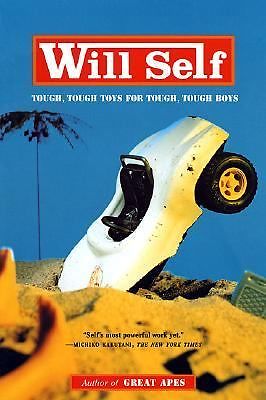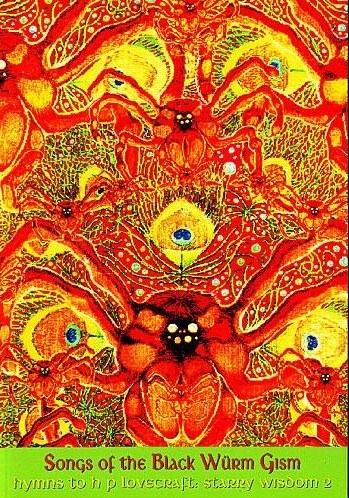 In 2012 I read Will Self for the first time – a free online story called “The Rock of Crack As Big as the Ritz”. This “free” story ended up costing me $10.95AUD, as I had to get the full collection immediately to find out how it ended.
In 2012 I read Will Self for the first time – a free online story called “The Rock of Crack As Big as the Ritz”. This “free” story ended up costing me $10.95AUD, as I had to get the full collection immediately to find out how it ended.
It was a taut, exciting story about a black ex-serviceman who is trying to stay straight and instead spirals into a life of crime like a spider down a plughole. It was impossible and surreal but gritty and naturalistic. It broke all sorts of rules about showing-and-not-telling, but that only helped accelerate the story’s pace. The main character, Danny, is unlikeable, and yet I like him – no contradiction there. “Rock of Crack” is an a pulse-pounding page-turner, a non-stop thrill-ride, an [insert gratuitously hyphenated compound words here], and its sequel in this collection, “The Nonce Prize”, is nearly as good.
The other stories are more diverting than fascinating, although I liked “Flytopia”, which is about a man who can communicate with insects in his house. Very much like a Paul Jennings story for grown-ups, with the surreal, pillowy quality of a dream five minutes before the alarm rings. The others are one-idea jokes – entertaining, but they don’t stay with you. “A Story for Europe” brings back the 80s fad of body-swap stories, but in a realistic and semi-serious way. “Design Faults in the Volvo 760 Turbo” is an amusing take on car fetishism.
Some of the stories don’t work – “Dave Too” is dull and obscurantist, for example. Will Self is a talented writer but I think he makes the common mistake of thinking that uninteresting stories will magically become interesting because he’s the one writing them. Not so. It’s the jokes that get the laughs, not the comedian.
“The Nonce Prize” brings back Danny and friends – sort of. The central conceit of “Rock of Crack” is missing (Self offhandedly writes it out of the story in a few sentences), and the characters’ personalities seem to have changed. But it does give Danny a shot at redemption, as he is framed for a brutal crime by a Yardie drug lord and railroaded to prison.
Away from drugs, and trying to avoid the usual fate of paedophiles behind bars, Danny takes a creative writing class and discovers that he has talent at something other than cutting crack. When he learns of a intraprison writing contest, he decides to enter. People looking for an uplifting Hollywood ending should keep looking, but the ending has a ray of hope for Danny, and is even inspirational after a fashion. A man stuck in mud has often won just by not allowing himself to be pulled down any further.
Toys/Boys should be viewed as either a good but inconsistent collection, or a very good two-part novella with some bonus stories. “Rock of Crack” and “The Nonce Prize” are both excellent (especially the former), but the others don’t measure up. Lightning might strike twice, but striking three times is a bit much to ask where Will Self is concerned.
 I don’t know if this really is his complete stories. It’s 1200 pages and the print’s really small.
I don’t know if this really is his complete stories. It’s 1200 pages and the print’s really small.
Ballard was either a genius or a near genius, and possessed an incredible imagination. Reading him gets uncomfortable, because my weaker imagination suffers feelings of inadequacy. I feel like a Commodore 64 downloading data from a CRAY supercomputer.
SF has historically come in two branches. The first deals in speculation, the second in reflection. The first deals in “what if” scenarios and whimsies of the imagination, the second deals with apocalypses and dystopias and the real-world consequences of those whimsies. Ray Bradbury and Arthur C. Clarke are masters of the first type, Harlan Ellison and John Christopher masters of the second, but JG Ballard did both styles really well. He writes mind-candy that’s also a poison pill – even his unabashed SF efforts are shot through with unease and disquiet, if not outright horror.
The first two stories are pleasant, then we get to “Concentration City” – a stark tale about a man trying to escape a claustrophobic urban jungle that seems to extend to infinity in every direction. Similar themes appear in a later story called “The Enormous Space”, which is about the discovery of a strange space station, about five hundred meters across. Astronauts land on it, and start exploring. The more the station is examined, the bigger it seems to be, until eventually it seems to enclose the entire universe.
And so on. Not all the stories are great, but even the mediocre ones have imagination, inventiveness, and the frisson of discovery. The 98 stories are in roughly chronological order, which breaks up the flow of the original collections but allows the opportunity to watch his style evolve, from his nostalgic golden age SF stories to his surreal, post-modern phase. His best stories contain elements of both periods. Ballard was an ideas man, but also something of a literary bridge-builder.
That’s a good thing, because although Ballard’s imagination was superhuman, as a writer he was merely adequate. Among other things, Ballard’s prose has a lot of disconnected metaphors – odd, confusing similes that are unrelatable to the object in the sentence. Stephen King gave a funny example in On Writing – “He sat stolidly beside the corpse, waiting for the medical examiner as patiently as a man waiting for a ham sandwich” – and Ballard is nearly as bad sometimes. A few paragraphs into “Prima Belladonna” and I was hit with “When I went up I found them grinning happily like two dogs who had just discovered an interesting tree”…what does that mean? Did they need to use the bathroom? In “The Time Tombs” a character says “after five minutes he drains me like a skull.” Out of all the drainable things in the world – sieves, basins, what have you, why a skull? What’s the illuminating connection there? Ballard’s writing is often good, but it often has a careless, smashed-out-at-120-words-a-minute quality, as if the ideas were too hot to stay inside Ballard’s brain and had to be put on the page as soon as possible.
Given the strength of some of these stories, I can’t blame him. But he’s the kind of writer where you have to ignore the trees and look at the forest – his ideas and imaginings are better than his sentences and his paragraphs. But when Ballard is on point, his ideas and imaginings are better than nearly everyone else. This is an amazing collection and should be sought out ahead of any of his novels.

In 1994, Creation published The Starry Wisdom, a collection of Lovecraft-inspired stories that remains the standard on how to take an author’s aesthetic and transplant it into different times and styles. Cyberpunk Lovecraft, beat Lovecraft, whatever. This isn’t an uncommon thing to try now (Nick Mamatas does it often), but at the time, it was almost revelatory. It was ambitious, far-reaching, and studded with big names (Ramsay Campbell, Alan Moore, JG Ballard) and classic stories.
In 2009, we got this Starry Wisdom Part 2: Featuring Worse Writers.
The book is shorter, and decidedly unstudded with big names. No Ballard. No Gira. Moore doesn’t contribute prose. Coulthart doesn’t contribute art. No Campbell or Burroughs. Whitechapel wrote a story, but it doesn’t appear here. At least we don’t have to read James Havoc’s girlfriend this time around, so thank fuck for that.
Instead, the material is written by guys from Creation and Savoy (Havoc, Britton, Mitchell…), with several obvious pen-names, and weird Japanese hentai crap. The results are uneven. Kenji Siratori doesn’t write a story so much as drop a bomb into the book, reducing clean virgin paper into a 5-page blast radius of sheer noise. Then there’s “visual art” by some guy called Wakamatsu Yukio. Japanese women covered in dead goldfish. Is that your thing? I confess it isn’t mine.
Black Wurm Gism has a talent problem, and also a value problem. Even with all the stupidity and filler, the book barely makes it to the 180 page mark. The Starry Wisdom was nearly forty pages longer, and had far more actual stories. Black Wurm Gism blows a lot of pages on odd surrealistic gestures.
The Starry Wisdom was dominated by conventional horror fiction, with a few experiments. Here the experiments dominate, with conventional horror fiction only briefly appearing like snatches of music emerging out of the atonal mess of an orchestra tuning up. DM Mitchell states that his intention was to steer Black Wurm Gism away from being a horror collection. He certainly succeeded – or failed, depending on your tastes. Personally, I would rather read JG Ballard than Kenji Siratori.
I liked the strange parts of Starry Wisdom, but Black Wurm Gism is obsessed with not making sense, and it leaves me cold. Why must everything be experimental and bizarre? Couldn’t they have included more than a few actual stories? If it’s an issue of content, what about William Hope Hodgeson…his work is now in the public domain now, isn’t it?
David Britton contributes a story from the Lord Horror universe. James Havoc co-writes a piece with “Herzan Chimera” (apparently comic artist Mike Philbin)…it’s funny seeing his prose straightjacketed into conventional style, like ape in a three piece suit. Otherwise it’s a steady trudge of obscurantist nobodies. Once the aforementioned fish-porn piece ends, we get the wonderfully titled but nearly unreadable “Machines Are Digging” by Reza Negarestani, a name I keep seeing in these kinds of books. He writes in a new genre called “theory fiction”, and it’s fairly clear why it’s a new genre.
If you liked the first book and want another fix, Songs of the Black Wurm Gism is what you’re looking for. But be warned: this time the china white has been cut with sawdust. It’s an inferior product, and I wish Mitchell had thrown Siratori and Negarestani and all the rest of these dickfucks away, kept the good stories, and released them in an updated version of Starry Wisdom. Horror collections live and die on the strength of their stories. Ten pages of naked women covered in fish is not a substitute.
 In 2012 I read Will Self for the first time – a free online story called “The Rock of Crack As Big as the Ritz”. This “free” story ended up costing me $10.95AUD, as I had to get the full collection immediately to find out how it ended.
In 2012 I read Will Self for the first time – a free online story called “The Rock of Crack As Big as the Ritz”. This “free” story ended up costing me $10.95AUD, as I had to get the full collection immediately to find out how it ended.

